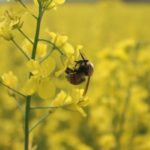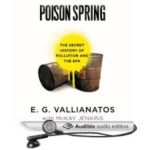-
Contaminated Wildflower Nectar and Pollen Puts Bees and Humans at RiskAs first reported by Sustainable Pulse, Contaminated Wildflower Nectar and Pollen Puts Bees and Humans at Risk. Bees are likely to be at high risk from exposure to glyphosate, the most widely used weedkiller in the world, via contaminated wildflower nectar and pollen after pre-harvest spray...
-
Poison Spring: The Secret History of Pollution and The EPAE.G. Vallianatos worked for the Environmental Protection Agency (EPA) for 25 years and saw things from the inside. What he learned about this agency, whose mission is “to protect human health and the environment,” is unconscionable. E.G. spoke with me this week and shared the factual ...
-
Massive Honeybee Die-Off in CaliforniaNearly a million honeybees lost–pesticides are suspected to be the cause. Last October, amateur beekeeper, Carrie Kappel, called the SBBA (Santa Barbara Beekeepers Association) when she saw hundreds of dead and dying bees outside her beehive in her backyard. “It was devastating to see...
-
Vanishing Of The Bees – E47
 Why are our honeybees vanishing in alarming numbers? Food Integrity Now talked with co-directors, Maryam Henein and George Langworthy, about their recent film, Vanishing Of The Bees. This documentary takes a piercing investigative look at the economic, political and ecological implications of the worldwide disappearance of the honeybee. Henein and Langworthy discuss our current agricultural landscape and celebrates the ancient and sacred connection between man and the honeybee. The story highlights the positive changes that have resulted due to the tragic phenomenon known as “Colony Collapse Disorder.” Their movie unfolds as a dramatic tale of science and mystery. Henein is passionate about this extraordinary crisis and its greater meaning about the relationship between humankind and Mother Earth. The bees have a message – but will we listen.
Why are our honeybees vanishing in alarming numbers? Food Integrity Now talked with co-directors, Maryam Henein and George Langworthy, about their recent film, Vanishing Of The Bees. This documentary takes a piercing investigative look at the economic, political and ecological implications of the worldwide disappearance of the honeybee. Henein and Langworthy discuss our current agricultural landscape and celebrates the ancient and sacred connection between man and the honeybee. The story highlights the positive changes that have resulted due to the tragic phenomenon known as “Colony Collapse Disorder.” Their movie unfolds as a dramatic tale of science and mystery. Henein is passionate about this extraordinary crisis and its greater meaning about the relationship between humankind and Mother Earth. The bees have a message – but will we listen. -
EPA Approves Pesticide Linked to Colony Collapse Disorder
 The U.S. Environmental Protection Agency (EPA) has granted emergency approval for the use of the neonicotinoid pesticide dinotefuran to control brown marmorated stink bugs in seven eastern states. Dinotefuran is a member of the neonicotinoid family of systemic pesticides that is known to be highly toxic to bees and associated with Colony Collapse Disorder.
The U.S. Environmental Protection Agency (EPA) has granted emergency approval for the use of the neonicotinoid pesticide dinotefuran to control brown marmorated stink bugs in seven eastern states. Dinotefuran is a member of the neonicotinoid family of systemic pesticides that is known to be highly toxic to bees and associated with Colony Collapse Disorder.


